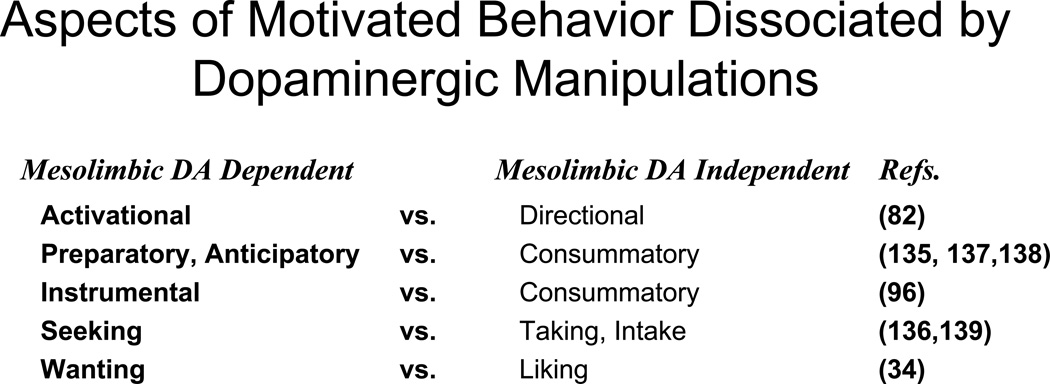Figure 1.
For several years, researchers have been making distinctions between aspects of motivated behavior that are differentially affected by dopaminergic manipulations. Salamone (82) emphasized the distinction between directional aspects of motivation (i.e., that behavior is directed towards or away from stimuli) and activational aspects of motivation (i.e., that motivated by behavior is characterized by a high degree of activity, vigor and persistence), and suggested that DA antagonists impair activational aspects of food motivation but leave directional aspects intact. Blackburn et al. (135) suggested that DA antagonists impaired preparatory behaviors instigated by a conditioned stimulus at doses that did not impair consummatory behavior. Salamone (96) emphasized the distinction between consummatory behaviors and instrumental responses, and also tried to link this distinction to others by stating that highly active instrumental behaviors elicited and supported by conditioned stimuli are very sensitive to disruption of accumbens DA transmission. Berridge (34) distinguished between the role of DA in “liking” vs. “wanting”, and suggested that interference with striatal and accumbens DA transmission affected incentive motivation (“wanting”) for sucrose, but had little effect on hedonic reactions instigated by sucrose (“liking”). Foltin (136) distinguished between food “seeking” (i.e., instrumental responses reinforced by food) vs. “taking” (consumption), and reported that amphetamine increased food seeking behavior while decreasing food taking behavior. More recently, Ikemoto and Panksepp (137) and Burgdorf and Panksepp (138) stated that it is useful to distinguish between consummatory “reward”, which is relatively unaffected by interference with accumbens DA transmission, and preparatory or anticipatory aspects of “reward”, which are more greatly impaired. Czakowski et al. (139) studied the effects of DA antagonism on ethanol seeking and intake, and reported that the D2 antagonist remoxipride had substantial effects on measures of ethanol seeking behavior (lever pressing) in a dose range that had little effect on ethanol intake.

